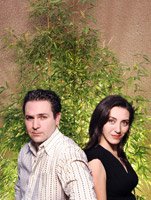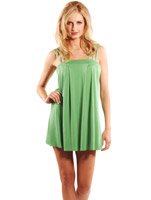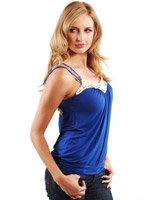Eco Focus: Pure Product
Sworn Virgins is both green and vertical
Fashion designers are known for their creative vision. Roshanne Aghevli has that, plus a whole lot more.
When she founded Sworn Virgins in 2005, Aghevli didn’t just want to make clothes that were sexy, comfortable, and easy to care for. She wanted her company to be vertical—to do all the fabrics, dyeing, cutting and sewing, and shipping right here in Los Angeles. She also wanted everything about the company, from its products to everyday practices, to be eco-friendly.
In partnership with textile manufacturer Alex Amini, Aghevli fulfilled her vision. Sworn Virgins is both domestic and green, with headquarters in Vernon, Calif., and a collection entirely made from bamboo. The line is carried in such stores as Fred Segal Fun in Los Angeles, Jami Lyn in Beverly Hills, and Big Drop in New York City.
Currently run by a staff of nine, Sworn Virgins is growing fast, and Aghevli is “looking forward to really taking off in 2008.”
The California Apparel News spoke with the designer about what it takes to launch a vertical business, the benefits of working in bamboo, and her mission to enlighten the world about going green.
CAN: Why did you want to manufacture domestically?RA: I was in the fashion business for a number of years at different big companies, and it was disheartening to see all the business go offshore. We wanted to support the industry here. When you know what happens in the apparel industry overseas, and on what scale, it’s really unsettling.CAN: What do you mean? RA: Knowing that they don’t necessarily have the laws for dumping dyes, and all of the environmental issues aren’t necessarily a concern, which is why so much business has gone overseas. So we decided to do everything here, where we can control the process. CAN: In addition to the higher environmental standard in the industrialized world, there’s almost something patriotic about producing domestically these days. On the other hand, don’t we have an obligation to give the developing world the opportunity to improve its conditions by giving it work?RA: It’s a Catch-22. On the one hand, where has our thriving domestic apparel manufacturing gone? It’s been detrimental to the textile sector in this country. CAN: So the Catch-22 is you can save the Earth or help developing nations, but it’s hard to do both. RA: Right.
CAN: And you’ve put eco first, feeling there’s enough that’s been outsourced anyway. RA: Absolutely. Plus, people love to see “Made in America,” because it’s not something you see that often nowadays. CAN: But I’ve interviewed some companies who say the consumer doesn’t care where her clothes are made. She wants the right look at the right price.RA: It goes both ways. We get responses like that as well. But the majority of our customers like the fact that we’re domestic because we can turn around business a lot more quickly than offshore companies that are working three to six months out.
So our customers really appreciate our ability to respond to what the overall trends are. Customers out there are fickle; trends change, and they want different looks. CAN: What is your lead time?RA: From four to six weeks from order to delivery, if not sooner. CAN: And what about from design conception?RA: Our seasons are scheduled out just like everyone else’s, but our real advantage is being domestic, because our buyers don’t have to tie up their dollars four to six months out. CAN: Why did you decide to go vertical?RA: It helps being in control of quality. If I were doing this overseas, I’d have to be there all the time to make sure things were well-made. Here our fabric and quality are consistent. Other people have to buy their fabric, then have someone dye it, and we avoid all that because we do it ourselves.
I guess it’s unusual for any company to be vertical nowadays. We’re a minority out there. CAN: There are really two angles to your story: being eco and being vertical, and you can be one without the other. But you wanted to be both. RA: And in the contemporary arena we can be both. It would be harder if we were at a lower price point in the market. Our wholesale prices start at about $20 for leggings and our dresses go up to $90.
Our following really comes from the fashion element of our line. When Fred Segal Fun first wrote the line, they didn’t even know it was eco-friendly—they just liked it.
CAN: Do you recommend that companies go vertical, or is it too difficult?RA: With Alex’s background in the textiles market, that’s how we were able to accomplish it. He already had the infrastructure of a mill. For somebody starting up, it would be very difficult. CAN: So yours is really a partnership between a designer and a textile manufacturer, and if it were just you the designer, you wouldn’t have been able to launch vertically. RA: There’s no way I would recommend anybody doing this on their own. There’s no way you can do it all. CAN: Many new designers struggle with the business side of launching a line, and it sounds like you recommend a partnership so you can focus on the design. RA: This business has so many aspects you have to constantly watch over, and so for one person, I just think it would be detrimental. CAN: What else do you do that’s eco-friendly?RA: All of our packaging for shipping is cardboard and paper and 100 percent recyclable. We don’t use polybags. It’s really great now with this whole eco thing happening—you can buy recycled hangers.
In our office we make sure everybody recycles paper, bottles, and cans. And we make sure everyone turns off their computer at the end of the day. All these little things help.
CAN: Isn’t the dark side to the eco trend that there’s a danger of appearing holier-than-thou? Sort of, “I’m greener than you and therefore I’m a better person.” When you have a business meeting and people learn the things you do, things that they don’t do, how do you keep them from feeling like they’re being judged?RA: I tell them that there are things they can do differently, not necessarily that they’re a bad person because they haven’t done them yet, but that they still can.
I had one retailer on the East Coast say, “I don’t care about this eco thing, but my customers love your product—I need more!”
She didn’t care about the eco thing, but her customers did, and it made her more aware of it. And now she does care, so it’s nice to hear the stories that trickle up from the customer. And it also works the other way: When the customer is well educated by the salesperson, then they in turn can be enlightened.
CAN: But you do feel that everybody needs to go this way.RA: I think it’s really our responsibility for inhabiting the Earth. I don’t want to go live on Mars. CAN: So it’s your duty to convert people?RA: I think it’s everybody’s responsibility to take care of what they leave behind. CAN: Tell us about the fashion. What’s the vibe of the collection?RA: It’s really and truly for the modern woman. Our line has many styles in it, and the way I design everything is to really flatter a woman’s figure and forgive the areas she wants to forgive so she can look sexy and feel good when she’s wearing our clothes. I like to call it easy, effortless fashion.
Our stuff also travels really well. With bamboo, if it wrinkles, you hang it up and it just hangs out. It also doesn’t need any dry cleaning. CAN: So you purposely made your clothing so that it doesn’t need dry cleaning?RA: Yes, because conventional dry cleaning is very heavy on chemicals because of the solvents they use.
We really look at everything and how we can have the lowest impact possible. The whole eco concept is evolving every day; things are happening. It’s a matter of finding ways to piece by piece respond to make it better. CAN: How many pieces are there in the collection?RA: Each collection has 20 to 30 styles, and our Spring 2008 collection is very colorful and flirty. We do tops, dresses, and leggings are one of our best sellers. They’re like tights, but not synthetic. CAN: Tell us why you use bamboo as your sole fabric.RA: The great benefits of bamboo are that it’s a grass, so it grows like a weed without needing a synthetic fertilizer or pesticide. Cotton, especially organic cotton, requires a lot of water, and the good thing about bamboo is that it doesn’t require anything extra just because it’s organic. It also regulates body temperature better than cotton, and is a natural sunscreen. It’s hypo-allergenic and anti-microbial, so if you sweat in it, the odor doesn’t stay.
We source the yarn from a certified green supplier, then knit the fabric here. We also reuse water in the dyeing process.CAN: What’s the significance of the name Sworn Virgins?RA: Shock value. But it’s really the purity of the product: Once the customer puts on Sworn Virgins, if she isn’t a virgin already, she’ll become one.
























